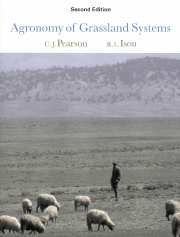Book contents
- Frontmatter
- Contents
- Preface
- 1 Overview: perspectives on grassland systems
- 2 The emergence of grassland systems
- 3 Generation
- 4 Vegetative growth
- 5 Flowering and seed production
- 6 Mineral nutrition
- 7 Herbage quality and animal intake
- 8 Grassland – animal interactions and management
- 9 Grassland systems design
- References
- Index
Preface
Published online by Cambridge University Press: 05 June 2012
- Frontmatter
- Contents
- Preface
- 1 Overview: perspectives on grassland systems
- 2 The emergence of grassland systems
- 3 Generation
- 4 Vegetative growth
- 5 Flowering and seed production
- 6 Mineral nutrition
- 7 Herbage quality and animal intake
- 8 Grassland – animal interactions and management
- 9 Grassland systems design
- References
- Index
Summary
Our worlds have changed significantly since we wrote the preface to the first edition in March 1986. The problems and opportunities surrounding grassland system change appear to us to have become more complex. The sustainability and ethical issues that we drew attention to in the first edition have assumed even greater importance. No longer can a grassland agronomist be concerned with only the technical issues that have preoccupied grassland agronomy for most of the last 50 years. In the last decade the failure of most project attempts at pastoral development in Africa have become apparent as has the increased nutrient pollution of intensive European grassland systems. The displacement of rainforest by pasture land has assumed international importance, as has the need to maintain biodiversity and concerns for the loss of organic matter from many agricultural soils. These trends were apparent to us in 1985–86 and informed our thinking as we prepared the first edition. The challenges we face are even more apparent today and convince us that traditional modes of research and development are no longer adequate.
The complex, messy problems that the next generation of grassland agronomists will attempt to address will require skills and understanding that are not found within conventional agronomy texts. Thus for many readers this new edition will be very different in its approach to grassland agronomy.
The extensive changes within this second edition also reflect our own changing perspective on the nature of grassland systems. We remain committed to a systems perspective. Systems-thinking receives greater emphasis than in the first edition.
Information
- Type
- Chapter
- Information
- Agronomy of Grassland Systems , pp. xi - xiiPublisher: Cambridge University PressPrint publication year: 1997
